Because math and science build futures
Biennial Impact Report | 2020 – 2021
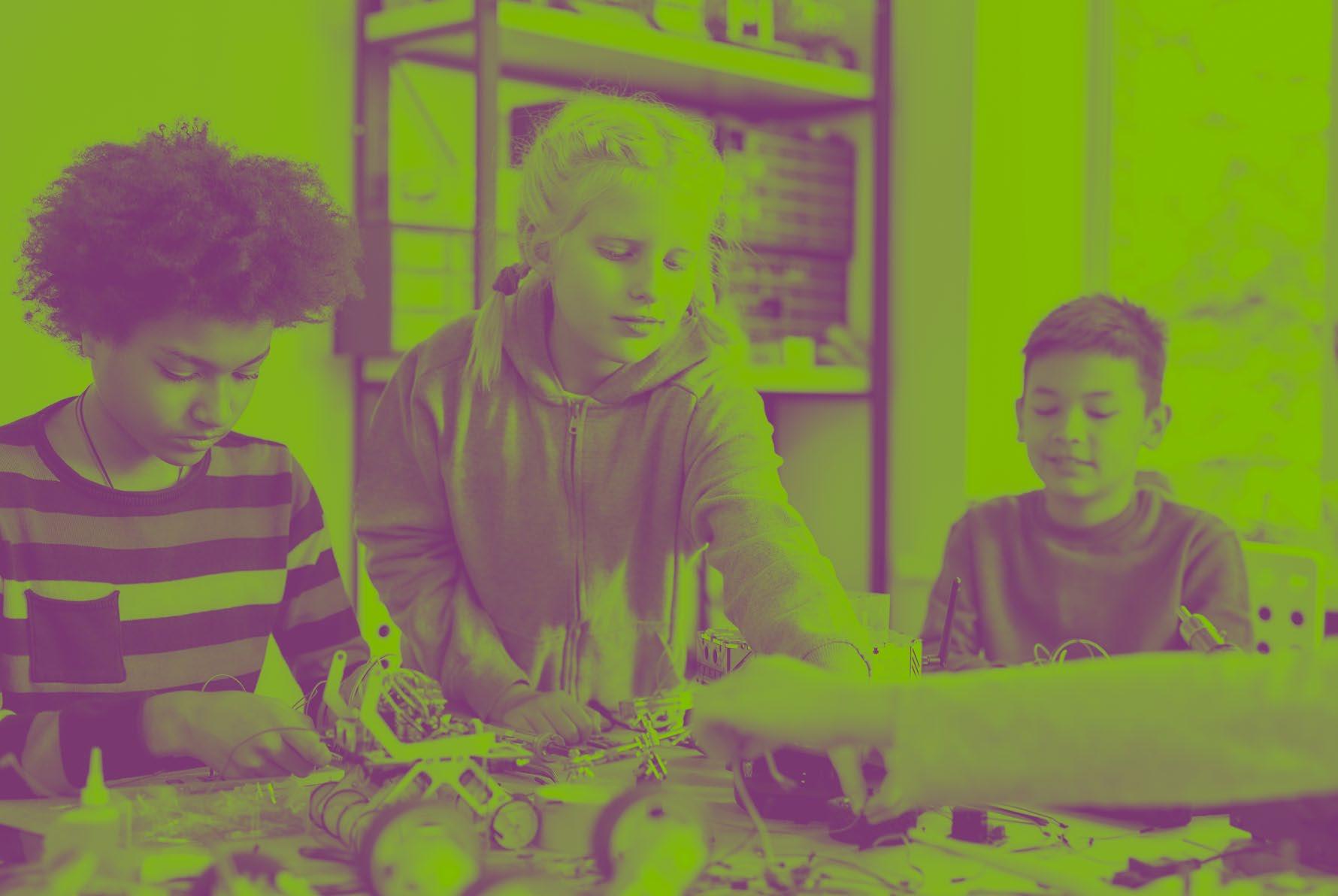

TERC’s mission is to improve math and science education for all learners.
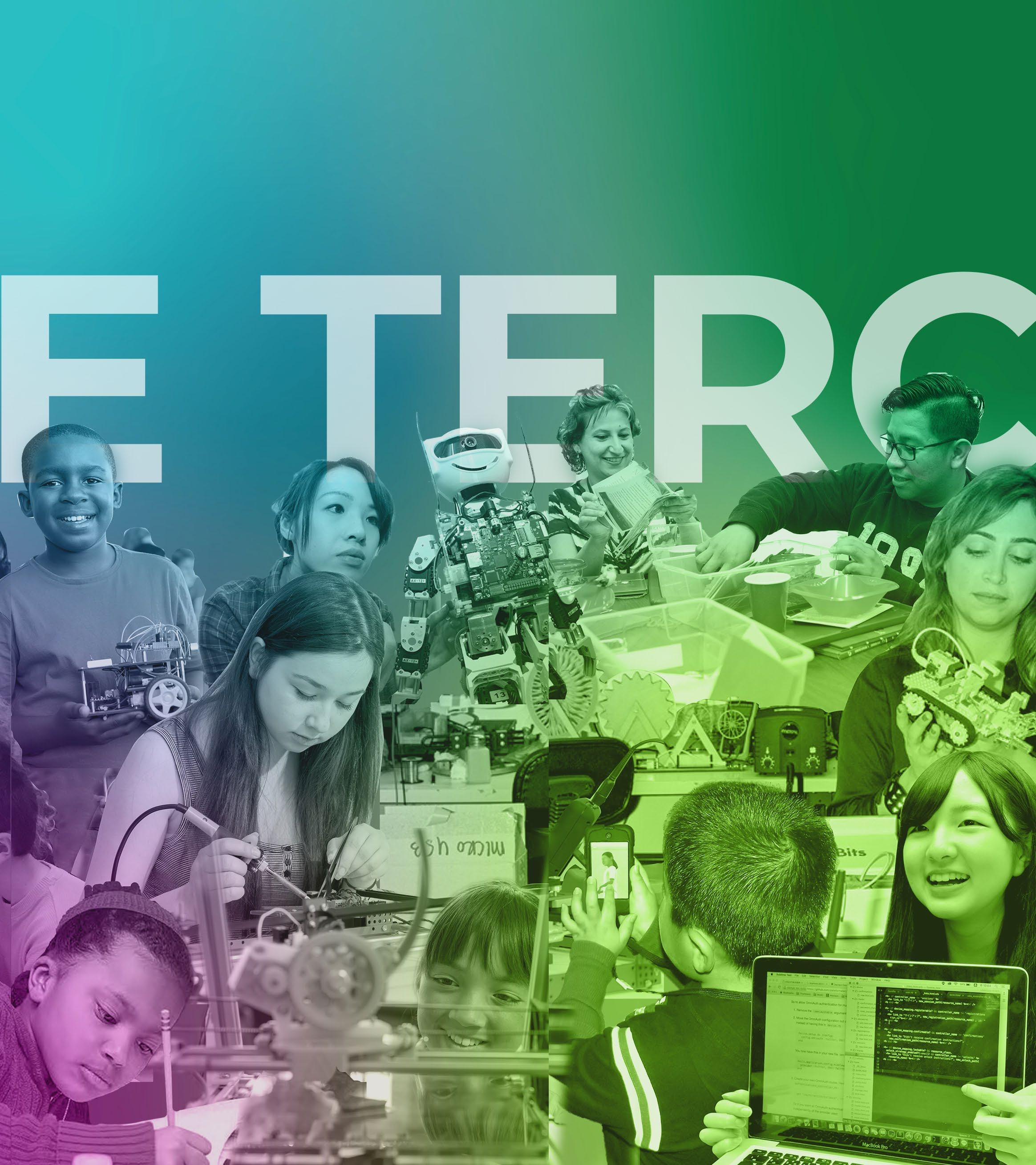
1
We believe STEM moves the world forward. And we exist to move STEM learning forward.
TERC envisions a future in which diverse communities of learners engage in creative, rigorous, and reflective inquiry as an integral part of their lives, a future where questioning, problem-solving, and experimentation are commonplace. This vision is grounded in the belief that STEM literacies are critical to strengthening and preserving a democratic society.
For more than 55 years, TERC’s work has revolved around fundamental questions related to teaching and learning in both formal and informal settings. This work has stayed grounded in the realities of today’s education spaces by collaborating directly with teaching professionals.
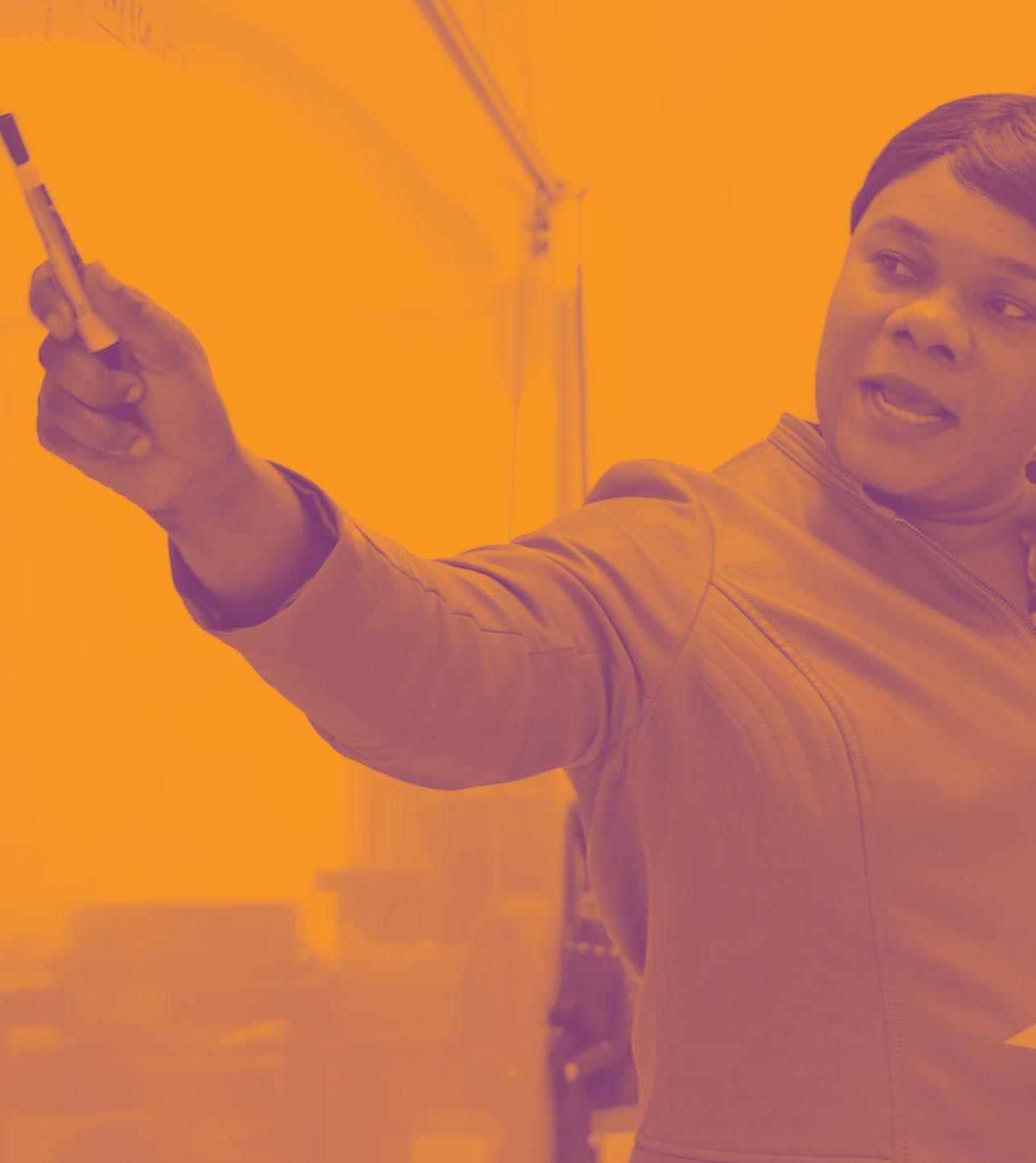
2
TERC’s 60+ math and science education and research experts work at the frontiers of theory and practice, not only to develop innovative curricula and other materials, but also to enhance instruction through professional development, to design educational applications of new technologies, and to create rigorous evaluation plans to support reform.
TERC is a nonprofit organization. Visit TERC.edu to learn more about our work and join us in moving the world forward with STEM education.

3
A Message from TERC’s Board Chair
Dear TERC Community,
In 2020 and 2021 we faced the dual challenges of the pandemic and associated reckoning with racial and social injustice. Closer to home, we saw the massive impact of nationwide school closures, a shift to online learning, and social isolation. Together, these challenges spawned a renewed and sometimes new awareness, call for action, and actual (small) change towards a better society. During this time, I am proud to say that TERC was a force for good and continues to be moving forward.
TERC responded to the “natural experiment” that occurred in our education system by quickly shifting to online work, retooling its many research and development projects, and increasing its focus on social justice and antiracist-oriented work. We were successful in receiving new funding for projects that will make significant contributions towards more informed, scientifically literate, and empowered communities who can fully participate in our pluralistic and democratic society. If anything, 2020/21 has shown TERC’s resilience as an organization, and our ability to translate our vision into action, to “[imagine] a future in which learners from diverse communities engage in creative, rigorous, and reflective inquiry as an integral part of their lives” and in which “science and math literacies are critical to strengthening and preserving a democratic society.”
Our success in 2020/21 laid the foundation for exciting new work in 2022/23 and beyond. We will continue to do research on science and math education that matters, is done in partnership with communities, is inspired by and addresses societal need, and is creative, innovative, and equity-based. And we will serve communities in new ways. We believe that math and science build futures, and this belief will guide our support of all people’s abilities to take part in their futures. We have encountered huge challenges, but as the pages of this report show, we are also part of ongoing progress, social innovation, and significant improvements. TERC is needed now more than ever!
With gratitude,
 Martin Storksdieck, Ph.D. Board of Trustees Chair
Martin Storksdieck, Ph.D. Board of Trustees Chair
Martin Storksdieck directs Oregon State University’s campus-wide STEM Research Center and holds an appointment as professor in the College of Education.

4
A Message from TERC’s President
Dear TERC Friends,
A core value for TERC throughout its 57 years is the belief that individuals of all ages, backgrounds, and abilities can learn, develop agency, and contribute to a democratic society. This value is evident throughout our biennial impact report, the first in almost 20 years. You will see how our deeply held commitment to accessible, high-quality, inquiry-based STEM education research drives our R&D efforts. It also informs our collaborations with colleagues and the 25,000+ diverse learners that we work alongside and serve.
Read on to learn more about TERC’s work across STEM disciplines, including: our project with the YMCA engaging families in early math learning in Make Connections: You and Me and Math; professional development sessions for teachers using our K–5 Investigations math curriculum; professional development for adult educators via our Adult Numeracy Center; and INFACT, whose focus is on helping neurodiverse students excel in the classroom utilizing computational thinking. The STEM for All Video Showcase, a platform created to connect researchers, practitioners, policymakers, and educators, featured almost 300 projects and supported over 78,000 visitors from 156 countries in 2021 alone. The reach and impact of this medium over the past 10 years of its existence is staggering.
I am so proud of how TERC staff came together during these first years of COVID-19 to create and share ideas for collecting data, while maintaining family privacy and regulatory compliance; developed and shared free resources for teachers to use in their online teaching; and shifted to remote operations internally with a moment’s notice while maintaining integrity across all areas. It is exciting that we have returned to an education ecosystem where we can physically work alongside teachers, facilitators, learners, and the public, integrating technology and curriculum to aid in classroom practice, developing and piloting models, materials, and tools, and sharing said results at professional conferences.
We are always interested in pursuing new partnerships and learning how we can support learning in the classroom and informal learning settings. We encourage you to visit TERC.edu to sign up to join our mailing list, connect via social media, or learn more about our work.

Sincerely,
Laurie Brennan President

5
Laurie Brennan has served as TERC’s president since 2016 and has been with the organization since 1994.
Research and Development Projects that Shape the STEM Education Field
With a passion for social justice, TERC strives to create level playing fields by making STEM more accessible to all learners. TERC’s work encompasses research, content and curriculum development, technology innovation, professional development, and program evaluation. Through our curricula and programs, learners develop the knowledge and skills necessary to ask questions, solve problems, and expand their opportunities. Our professional development and evaluation work helps teachers and facilitators utilize new tools, materials, and inquiry-based strategies to enrich students’ experience.
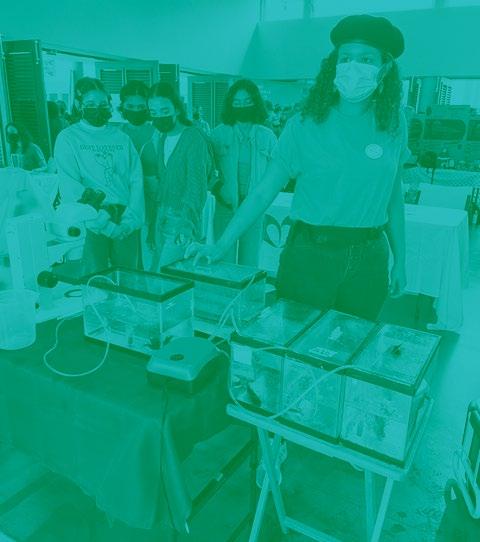
6
6
TERC BY THE NUMBERS
IN THE U.S. AND THE GLOBE *
DURING 2020–2021, MORE THAN 100 INNOVATIVE TERC-LED PROJECTS MOVED THROUGH DESIGN RESEARCH, PARTICIPANT RECRUITMENT, DATA COLLECTION, DATA ANALYSIS, VALIDITY TESTING, EFFICACY STUDY, SETUP/DESIGN, ACTIVE PROGRAM PARTICIPATION, INTERVIEWS AND OBSERVATIONS, AND DISSEMINATION/REPORTING. THESE PROJECTS ENGAGED 25,805 LEARNERS WORLDWIDE.

TERC’S


111



PROJECTS





REACHED 25 , 805
PEOPLE ACROSS THE U.S. AND THE GLOBE
PEOPLE WORKED WITH/IMPACTED IN THE US
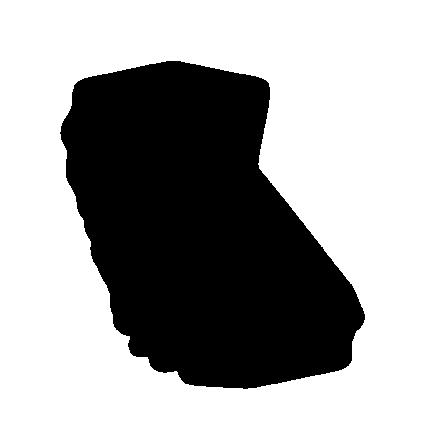
585 115 2716 12 743 40 42 48 8 394 34 987 9 59 686 413 25 25 143 56 185 7094 10 79 332 503 61 126 289 40 11 3645 107 7
* Fourteen projects were unable to determine a total of 6,053 participant locations for various reasons, including virtual surveys, workshops, and professional development sessions where individual locations were not recorded. One project completed anonymous survey panels and focus groups with tens to hundreds of adult news consumers; these data are not reflected in this map.
IN THE CLASSROOM
MUCH OF TERC’S RESEARCH AND DEVELOPMENT TAKES PLACE IN PUBLIC SCHOOLS. TERC’S TALENTED CONTENT EXPERTS TAKE A LEARNER-CENTERED APPROACH IN THEIR RESEARCH AND MATERIAL DEVELOPMENT TO SUPPORT SCHOOL IMPROVEMENT AND CONTRIBUTE TO THE UNDERSTANDING OF LEARNING AND TEACHING.
THE DATA REPRESENTED BELOW REFLECTS TERC’S WORK SPECIFICALLY IN PUBLIC SCHOOLS IN 2020–2021.
67 PROJECTS 10 , 645 PEOPLE (10,126 STUDENTS AND 519 TEACHERS)









BELOW POVERTY

8
WHITE TWO OR MORE RACES ASIAN HISPANIC BLACK 62% 18% 13% 5% 2% SPEAKS ENGLISH LESS THAN WELL WITH A
DISABILITY
SPEAKS ENGLISH VERY WELL 16% 18% 19% 6% 4%
FAMILIES WITH INCOME
LEVEL FAMILIES WITH FOOD STAMPS/ SNAP BENEFITS
DEMOGRAPHICS
WORKED WITH/IMPACTED TERC'S
POPULATIONS SERVED
AREAS OF FOCUS


















TERC’S PROJECTS ENCOMPASSED A WIDE RANGE OF SUBJECTS WITHIN STEM EDUCATION WHILE INSPIRING AND ENGAGING MANY POPULATIONS OF LEARNERS.
THE DATA REPRESENTED BELOW REFLECTS THE 2020–2021 PROJECTS THAT FALL INTO THESE FOCUS POPULATIONS AND CONTENT AREAS. AN INDIVIDUAL PROJECT MAY BE CATEGORIZED IN MULTIPLE AREAS.
9
FOCUS POPULATIONS EARLY AND ELEMENTARY SCHOOL MIDDLE SCHOOL HIGH SCHOOL RACE/ETHNICITY HIGHER EDUCATION ADULT EDUCATION GENDER DISABILITIES ENGLISH LANGUAGE LEARNERS 46 41 29 27 23 15 15 18 13 CONTENT AREAS RESEARCH/ EVALUATION SCIENCE MATH PROFESSIONAL DEVELOPMENT INFORMAL EDUCATION TECHNOLOGY COMPUTATIONAL THINKING ENGINEERING COMPUTER SCIENCE 61 59 47 40 33 31 24 21 14
Institute for Meta-Synthesis (IMS): A Practicum through the Lens of STEM Equity and Inclusion Literature

Meta-synthesis is a rigorous approach to searching for, selecting, analyzing, and synthesizing findings from multiple qualitative research studies in order to investigate a synthesis question and ultimately to construct greater meaning for a field. IMS is a three-year project that will build the capacity of graduate students and early-career STEM and STEM education faculty/staff to conduct qualitative meta-synthesis research, with a special focus on STEM equity and inclusion literature. Ultimately, participants will be equipped with skills for constructing competitive synthesis grant proposals and executing successful synthesis projects.
In 2020–2021, the project concentrated on developing and virtually piloting workshop modules at two of our partner institutions (Boston University and University of Georgia) and offering a threehour webinar through the AERA-ICPSR PEERS Hub. The AERA webinar was offered virtually, and this had the unanticipated outcome of people attending from around the world, including from Australia, Brazil, China, Germany, and Saudi Arabia. Across the AERA webinar and the five pilot workshops, nearly 2,000 people participated in IMS offerings. Most attendees were from the U.S., and the majority identified as scholars of color. After testing the modules in these workshops/seminars, IMS started final revisions for 2022 workshops.
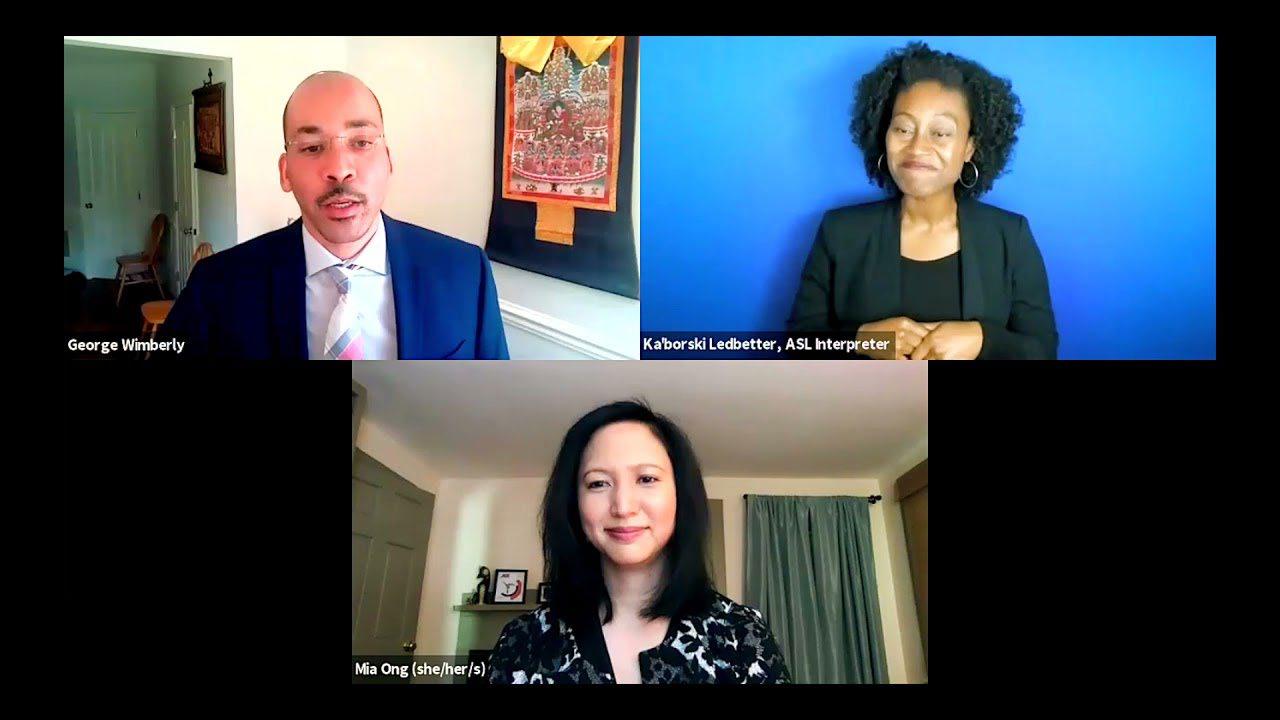
“Thank you for your thoroughness and efficiency covering a complex topic!”
—IMS participant
PROJECT HIGHLIGHT 10
Diversity, Equity, Inclusion, Access, and Belonging
The pandemic, which exposed deep racial and socioeconomic disparities, became a catalyst for the education sector to begin reckoning with systemic racism and inequity, and to examine the disenfranchisement of students of color, especially Black and Brown students, as well as educators and researchers of color.
TERC is committed to developing strategic solutions that dismantle systemic racism, rebuild more equitable educational environments, and foster a thriving STEM identity for all. Our ideologies and practices must be undergirded in a foundational understanding of equity, access, inclusion, and belonging. Ongoing self-reflection, critical evaluation, and re-evaluation of antiracist and culturally responsive practices are important factors in achieving this goal.

11
A number of TERC’s projects (some of them detailed in this report) center the voices of and collaborate with underrepresented and marginalized populations in STEM education, including Black and Brown students, English learners, neurodiverse learners, students with sensory disabilities, rural communities, and more.


Our work broaches educational equity from different perspectives and access points, with projects researching authentic and equitable family engagement, empowering indigenous frameworks and ways of knowing, supporting teacher diversity in professional development, conducting culturally responsive STEM education evaluation, expanding informal STEM education environments—from makerspaces and museums to after-school programs—and building research capacity for minority-serving institutions/organizations.
The TERC Scholars Program, STEM Education Research through a Social Justice Lens, provides undergraduate internships for students from racially and ethnically underrepresented backgrounds to diversify STEM education research and exposure to career pathways.
In 2023, TERC will welcome a cohort of student researchers and will support the direction of a new NSF Advancing Informal STEM Learning (AISL) Equity Resource Center called Reimagining Equity and Values in Informal STEM Education (REVISE), which will improve access of marginalized researchers and research organizations to federal research funding in the informal STEM education environment.
12
To center equity, TERC’s research must center marginalized voices and perspectives.
Head Start on Engineering is a multi-component, bilingual program designed to engage preschool children and their caregivers in the engineering process.
As we critically investigate the components of equitable learning environments, an equitable and inclusive workplace culture must reflect this same effort and analysis.
As an organization, we continue to educate ourselves on equityoriented and culturally responsive research frameworks to help inform policy and practice and evoke transformative social justice through our projects. The Office of Diversity, Equity, Inclusion, and Belonging (DEIB) curates book discussions (for example, Race After Technology and White Fragility), affinity groups, journal clubs (an Equity in STEM Education Research series), and social groups. The Office of DEIB has collaborated to create an in-house professional development webinar series to support growth and create conversation on improving TERC culture across topics such as the neurobiology of implicit bias, sexual harassment and grievance procedures, addressing microaggressions and power dynamics, and diversifying professional networks. TERC has emphasized the essential importance of mentorship from senior leaders to support emerging leadership, career sustainability and growth.
Together, this work will continue to refine our strategies and resources to fortify an infrastructure that successfully recruits and retains underrepresented staff and truly serves the needs of all learners.
Data Clubs introduce middle school youth, in both rural and urban out-ofschool settings, to the power of data by giving them tools for visualizing and analyzing data on topics they care about.


13
TERC’S internal culture must foster greater equitable access and career growth opportunity.
Make Connections: You and Me and Math
Make Connections represents a collaborative, multi-year effort to develop, evaluate, and nationally disseminate an English/Spanish math program for young children and their caregivers. The program includes interdisciplinary adult–child math units for ages 0–2 and 3–5. Baby play is full of math opportunities. For instance, as babies stack cups and explore what fits inside, they learn about sizes and shapes; as they clap with you, they become familiar with patterns. Make Connections shows how adults can highlight the math in these activities with math talk for babies, toddlers, and preschoolers, and by encouraging young children to explore sizes, shapes, amounts, and patterns in everyday life.
TERC and the YMCA of Silicon Valley (California) spent four years developing Make Connections in partnership with YMCA Early Learning Readiness (ELR) sites, which simultaneously engage children and their families, friends, and neighbor caregivers in a preschool setting. Development partners included programs serving low-income and immigrant families at YMCA of Silicon Valley, YMCA of Metro Los Angeles, YMCA of Merrimack Valley (Massachusetts), The Gateway Family YMCA (New Jersey), and YMCA of Southern Maine. Approximately 3,500 program facilitators, caregivers, and children were involved in Make Connections development. The complete program is now available at no cost via the YMCA (https://go.ymcasv.org/makeconnections/), with YMCA of Silicon Valley leading national dissemination.

PROJECT HIGHLIGHT 14
Investigations Center for Curriculum &
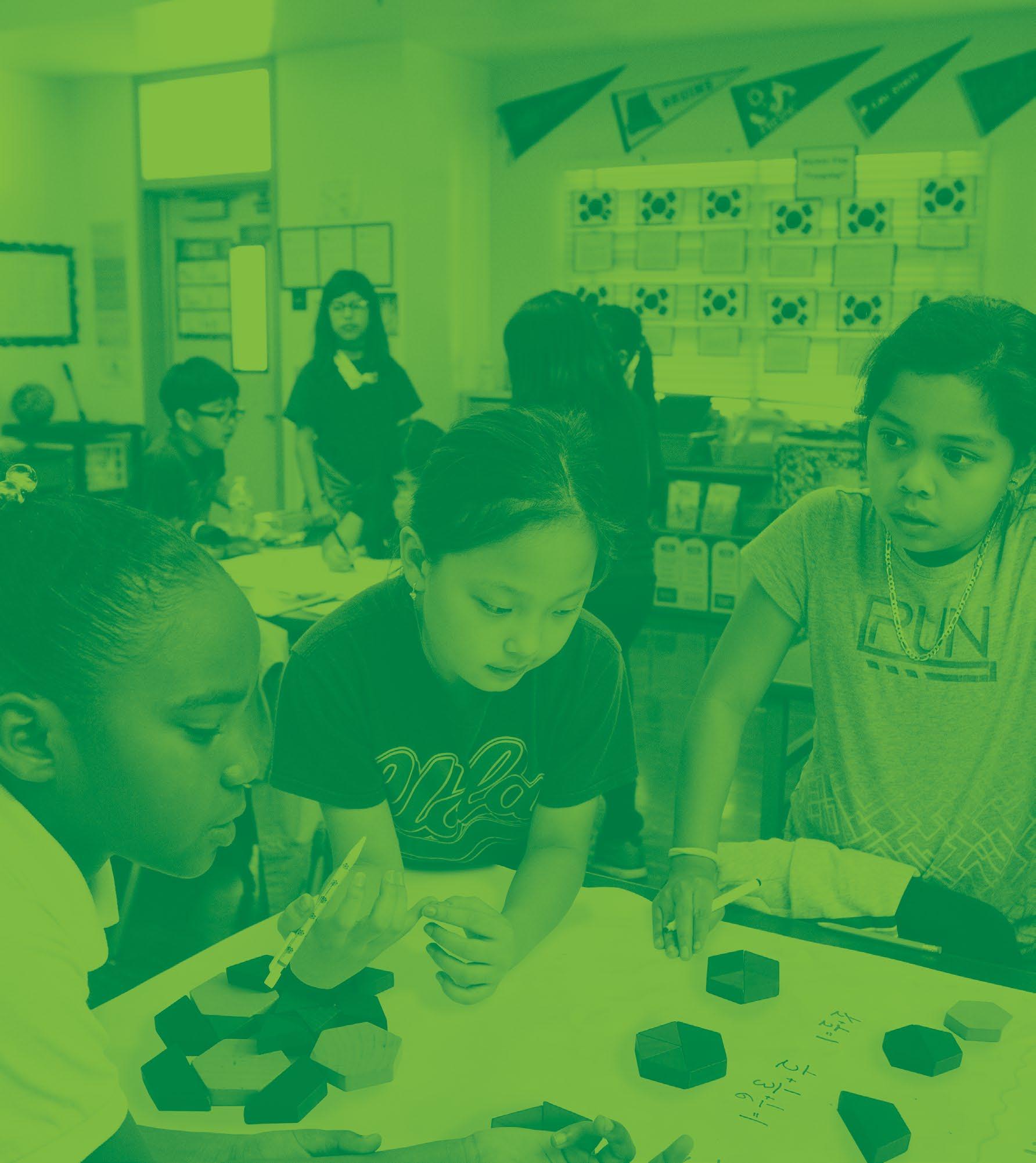
Professional Development
Investigations 3 is a focused and rigorous K–5 mathematics curriculum initially funded by the National Science Foundation. Now in its third edition, Investigations in Number, Data, and Space™, is based on more than 30 years of research and development, including extensive collaboration with teachers in a range of communities (i.e., urban, rural, and suburban areas).
As of 2021, Investigations has been used in schools and districts in 48 states as well as internationally.
15
Responding to Classroom Closures
To support educators, learners, and families during school closures due to the spread of COVID-19, Investigations created Investigations Math at Home. This evolving set of resources, many in English and Spanish, includes access to online math tools, home-based math activities for families, math games, and help for families to support students as they work on math problems.
Focus on Equity, Agency, and Identity in the Math Classroom
In 2020 and continuing to the present, the Investigations team is undertaking an in-depth study focused on these questions:
ĉ How can a mathematics curriculum be a tool for anti-racist work?
ĉ How can Investigations better support students who have been historically marginalized, especially Black and Brown students, to be doers of mathematics?
Through internal discussions, readings from the field, and collaboration with classroom teachers, math coaches, and principals whose work focuses on these issues, the team developed A Framework for Reflecting about Equity in the Investigations Mathematics Classroom, a resource for reflecting on issues of equity, identity, and agency in mathematics learning and teaching. The Framework identifies four categories to guide work towards equitable mathematics classrooms: 1) deep and rigorous mathematics; 2) equitable participation in a collaborative mathematics community; 3) strength-based assessment and accommodation; and 4) connections to students, their families, and communities. This work generated a series of blogs about issues of equity, access, identity, and agency in the Investigations classroom.
Ongoing work in these four categories includes highlighting aspects of the current curriculum to support equitable classrooms as well as developing new resources for teachers that focus on students’ identity and agency as mathematics learners.
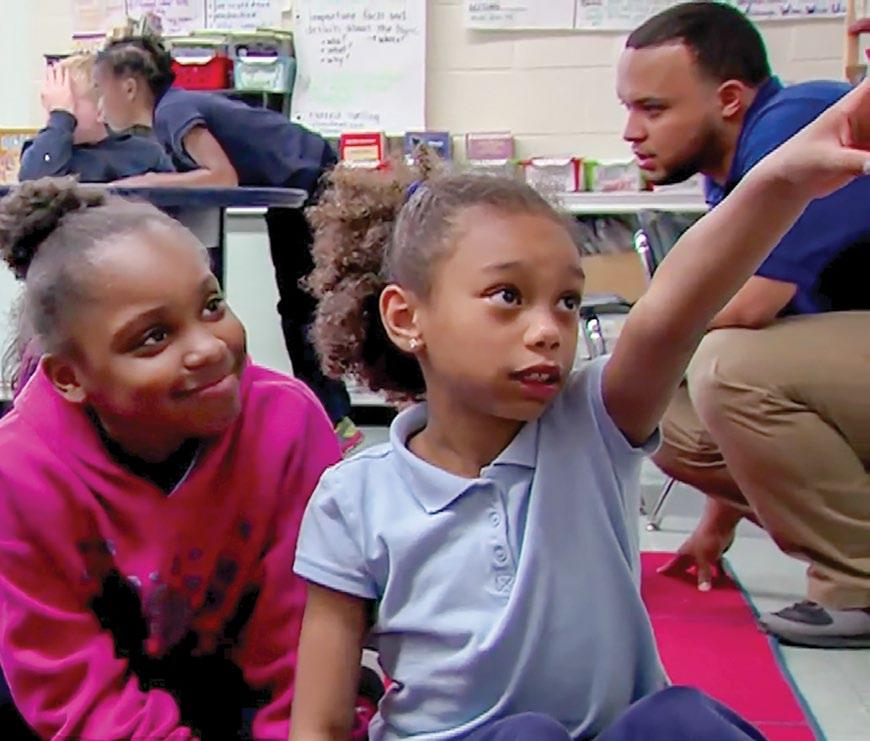
16
Investigations is field tested in a wide range of classrooms.
Professional Development
Investigations Professional Development
(PD) offers workshops, online courses, and customized PD opportunities that promote in-depth mathematics teaching and learning.
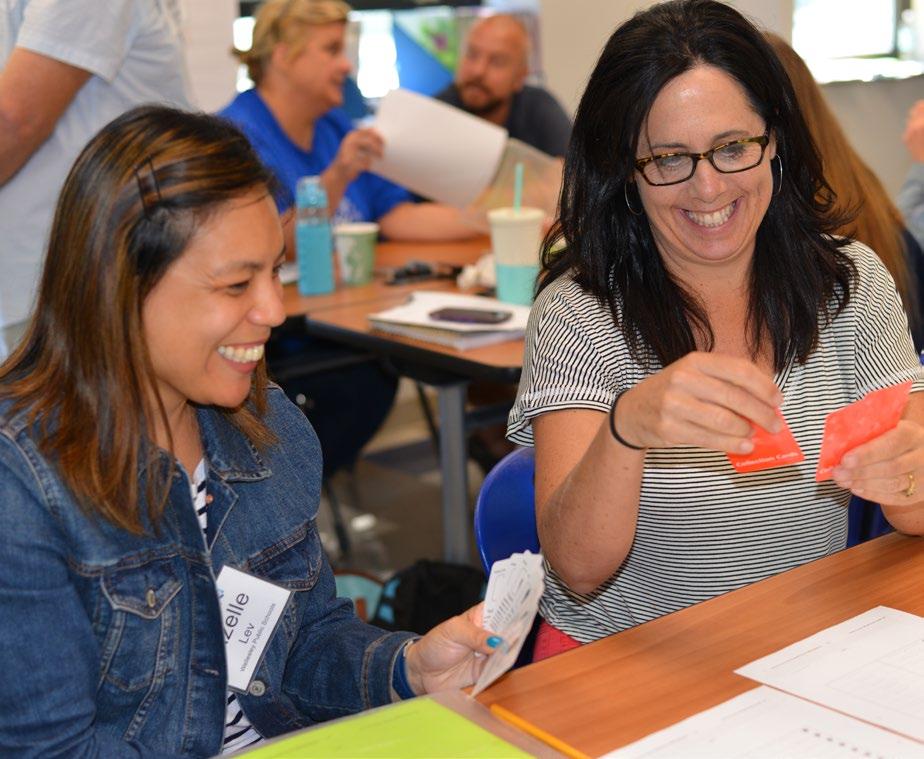
In 2020–2021, in response to school closures, Investigations PD pivoted to offering a wider array of online workshops and courses to support educators with engaging experiences that offered the opportunity to collaborate, reflect, and interact with colleagues and Investigations facilitators. Six courses were offered, with 228 classroom teachers, math coaches/specialists, special educators, and administrators participating. Eight short webinars, focused on supporting online learning and differentiation, were attended by hundreds of educators.

17
Investigations Professional Development is focused on making sense of mathematics.
“I would highly recommend this course to my colleagues who may want to learn more in depth about Investigations. The course truly gave me time to absorb the curriculum and have a better grasp of the concepts.”
—Teacher
PROJECT HIGHLIGHT STEM Education Evaluation Center (SEEC) at TERC
SEEC offers consultation, external evaluation, and research support for existing STEM education grants and programs and collaborates with proposal writing teams to design studies. SEEC staff respond to clients at various points in the process, focusing on needs assessments, formative development and feedback, summative outcomes, sustainability, and dissemination. The projects range in scale from close observations of individual training events to implementation of multi-year, multi-site evaluations on local, state, and national levels.

PROJECT HIGHLIGHT 18
Connecting Researchers, Practitioners, Policy Makers, and Educators Interested in Enhancing STEM Education
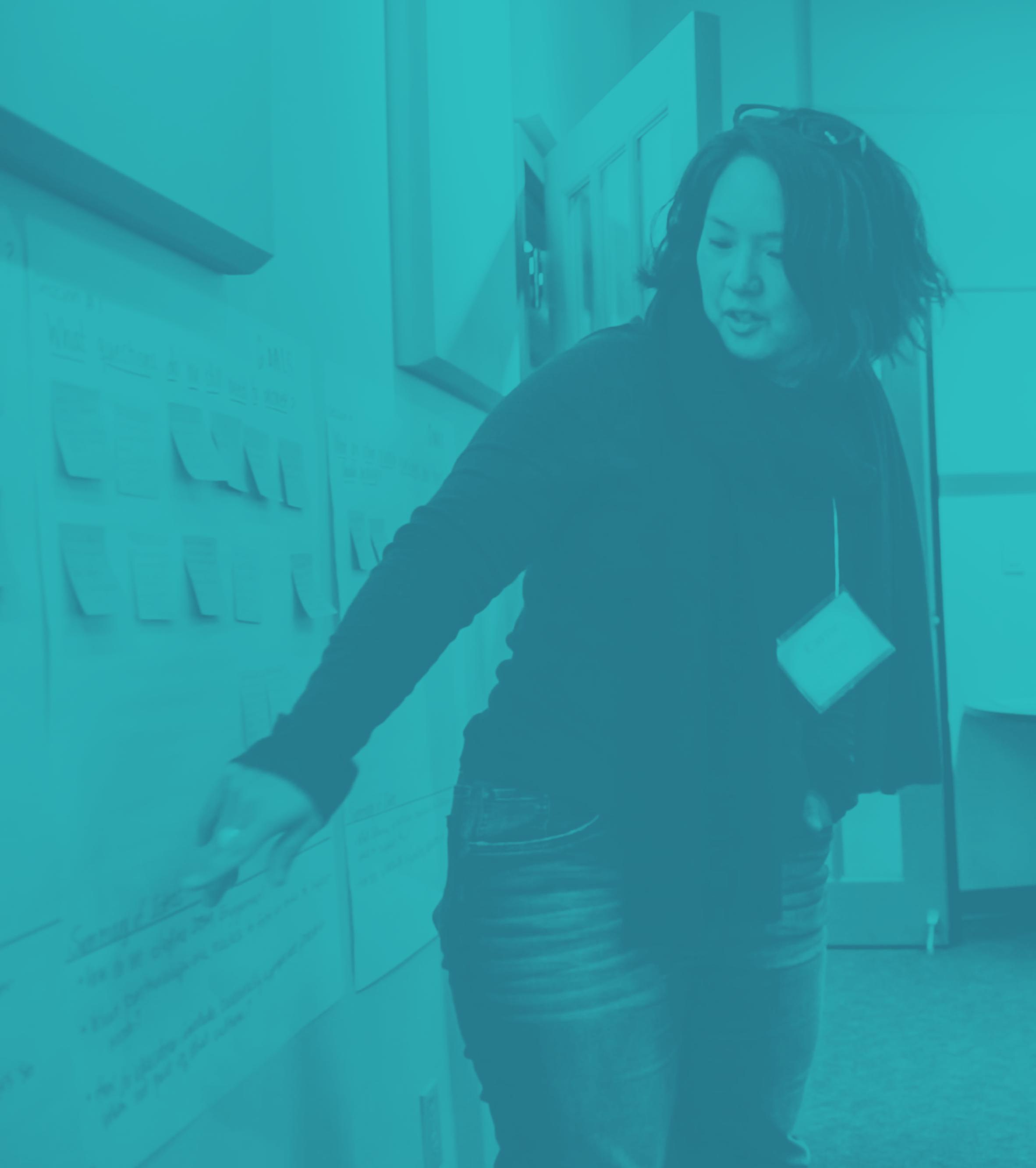
19
PROJECTS SHARED VIDEOS CREATED BY 1 , 114
LEAD AND CO-PRESENTERS WHO CAME FROM MORE THAN 478
DIFFERENT INSTITUTIONS AND ORGANIZATIONS
STEM for All Video Showcase
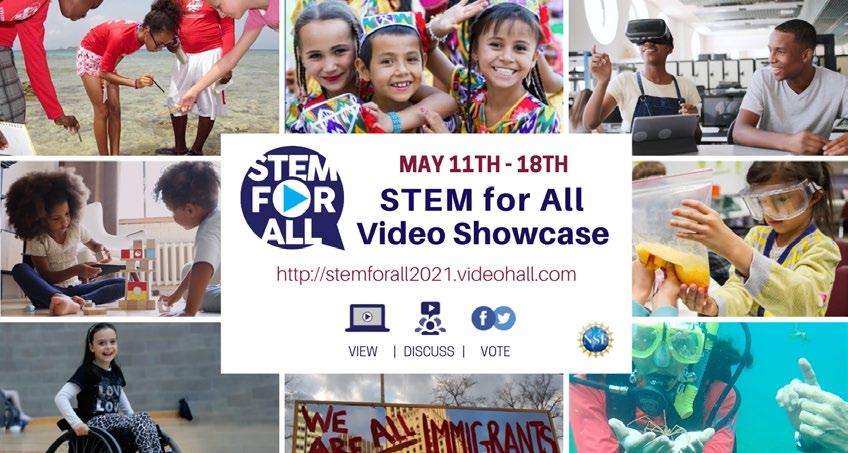
TERC’s annual STEM for All Video Showcase is a free, interactive, week-long event featuring three-minute video presentations of federally funded projects aimed at improving STEM and computer science education. The annual event encourages online dialogue and networking and gives attendees the opportunity to vote on their favorites. The 2021 STEM for All Video Showcase, on the theme of “COVID, Equity & Social Justice,” was held online from May 11 to May 18, 2021. Although the 2021 Showcase is now closed to new discussion posts, all videos and discussions remain accessible to the public at large.
Close to 300 projects were shared at the online event by 1,114 presenters, representing 478 institutions and organizations. A worldwide audience of 78,658 visitors viewed the Showcase website during the event and posted more than 7,000 comments. Among the innovative videos were Guitars, Rocketry, Robotics (Facilitators’ Choice) and Designing Hip-Hop Ecologies for Computational Learning (Public Choice). Targeted constituencies ranged from engineering design for rural middle-school students to middle-grade math for multilingual learners. Professional development subjects were also covered, such as Nevertheless, We Persisted: Collaboration During COVID-19 and Women with Disabilities in STEM Academic Careers (Presenters’ Choice).
STEM for All Multiplex
PROJECTS SHARED VIDEOS CREATED BY 696
LEAD AND CO-PRESENTERS WHO CAME FROM MORE THAN
300 DIFFERENT INSTITUTIONS AND ORGANIZATIONS
The STEM for All Multiplex is an extension of the STEM for All Video Showcase. This online interactive platform features the videos first presented at the Showcase event. The site hosts “Theme of the Month” events that explore a topic in-depth and show multiple approaches taken by different research projects to address a common challenge.
20
SHOWCASE PARTICIPATION
2021 287
2020 171
“This was a venue that allowed us to share our work with non-research audiences, as well as to generate connections and interactions with other researchers interested in our work. it was a very rewarding engagement experience!”
SHOWCASE VISITORS AND VIEWS
2021
78 , 658
UNIQUE USERS FROM 156
COUNTRIES VISITED THE SHOWCASE WEBSITE DURING THE EVENT
2020
STEM Teacher Leadership Network (STEMTLnet)
STEMTLnet’s interactive learning community and collegial network allows STEM teacher leaders and aspiring teacher leaders to share their paths, challenges, strategies, lessons learned, and resources. Each month, STEMTLnet hosts a webinar panel, open discussion, resources, and blog posts about a topic of interest to network members. Themes from 2020–2021 included Partnering Culturally Responsive Teaching and Place-Based Science Education, The Challenge of Creating Equity in Science Education, Integrating Emerging Technologies into Teaching Practice, Connecting Mathematics and Science Through Literature and Storytelling, and Technology & Teacher Leadership in the Time of COVID. Membership grew more than five-fold in the network’s first 18 months and represented a broad spectrum of educational roles.
“The NSF [National Science Foundation] is pleased to support a project that is developing an interactive professional learning community for STEM educators. There are excellent STEM teachers across our country who are leading in and out of the classroom each day. This project not only gives them needed resources, but also promises a network where they can grow and learn on their leadership journey together.”
—Nafeesa Owens, Program Director/Staff Associate within the Education and Human Resources Directorate at the NSF
56 , 466
UNIQUE USERS FROM
142

COUNTRIES VISITED THE SHOWCASE WEBSITE DURING THE EVENT
FACILITATED DISCUSSIONS
2021
7 , 290
COMMENTS POSTED ON THE VIDEOS
2020 6 , 218
21
COMMENTS POSTED ON THE VIDEOS
—STEM for All Video Showcase Co-presenter
Including Neurodiversity in Foundational and Applied Computational Thinking (INFACT)
INFACT helps neurodiverse students excel in the classroom. TERC is leading a team of expert researchers to design, research, develop, and implement a comprehensive set of teaching and learning materials for inclusive computational thinking (CT). INFACT introduces CT practices, such as problem decomposition, pattern recognition, abstraction, and algorithm design, through interactive learning games, robotics, and introductory coding activities, all with differentiated scaffolds for neurodiverse learners in grades 3–8.
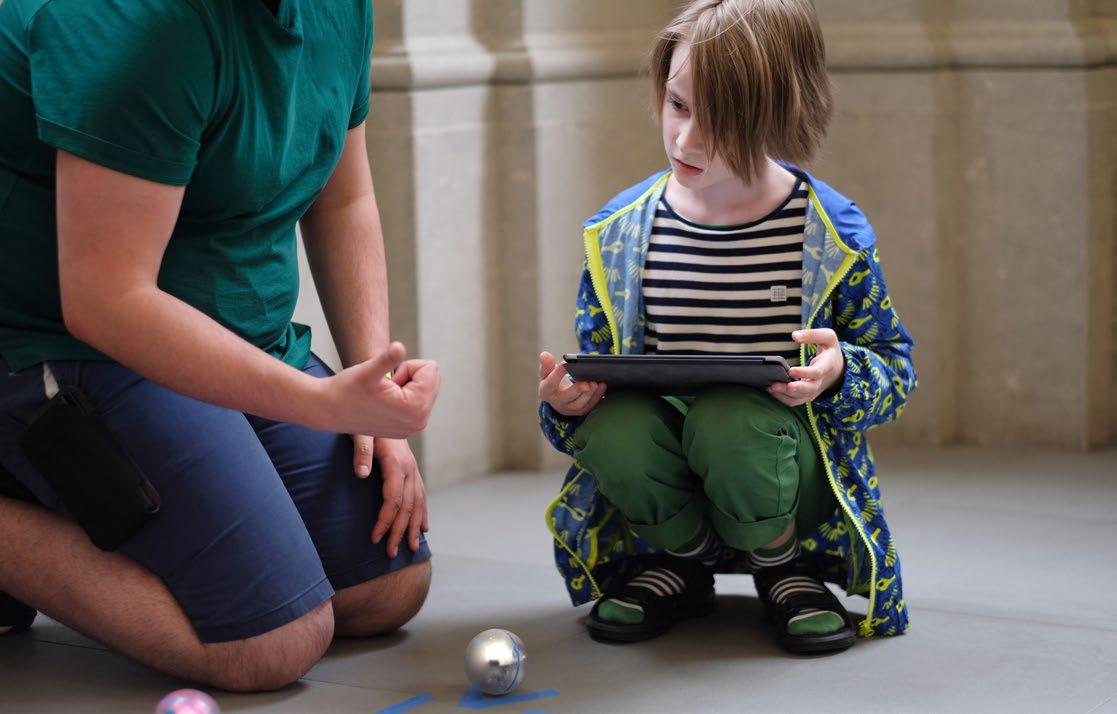
In 2020–2021, the team’s ongoing work focused on design research, validity testing, efficacy study, and design workshop groups. They partnered with 30 teachers and their students from 12 states to test materials and get their feedback. Approximately 160 home-based youth and summer school groups from around the country also volunteered to provide feedback. An efficacy study of INFACT showed that students demonstrated more improvement in CT outcomes using INFACT as compared to other CT programs.
“One of our students refuses to write in math class. He doesn’t have this skill and is really reluctant. However, in Zoombinis he became our class leader. He could describe and solve and communicate.”
PROJECT PROFILE
PROJECT HIGHLIGHT 22
—Teacher who tested INFACT materials
Adult Numeracy
The Adult Numeracy Center (ANC) at TERC helps adults and young adults understand how math is present and relevant in everyday life, and how they can use this knowledge to improve their lives and communities. With state and local partners, the ANC body of work offers many professional development and adult learning opportunities in high-quality math instruction.
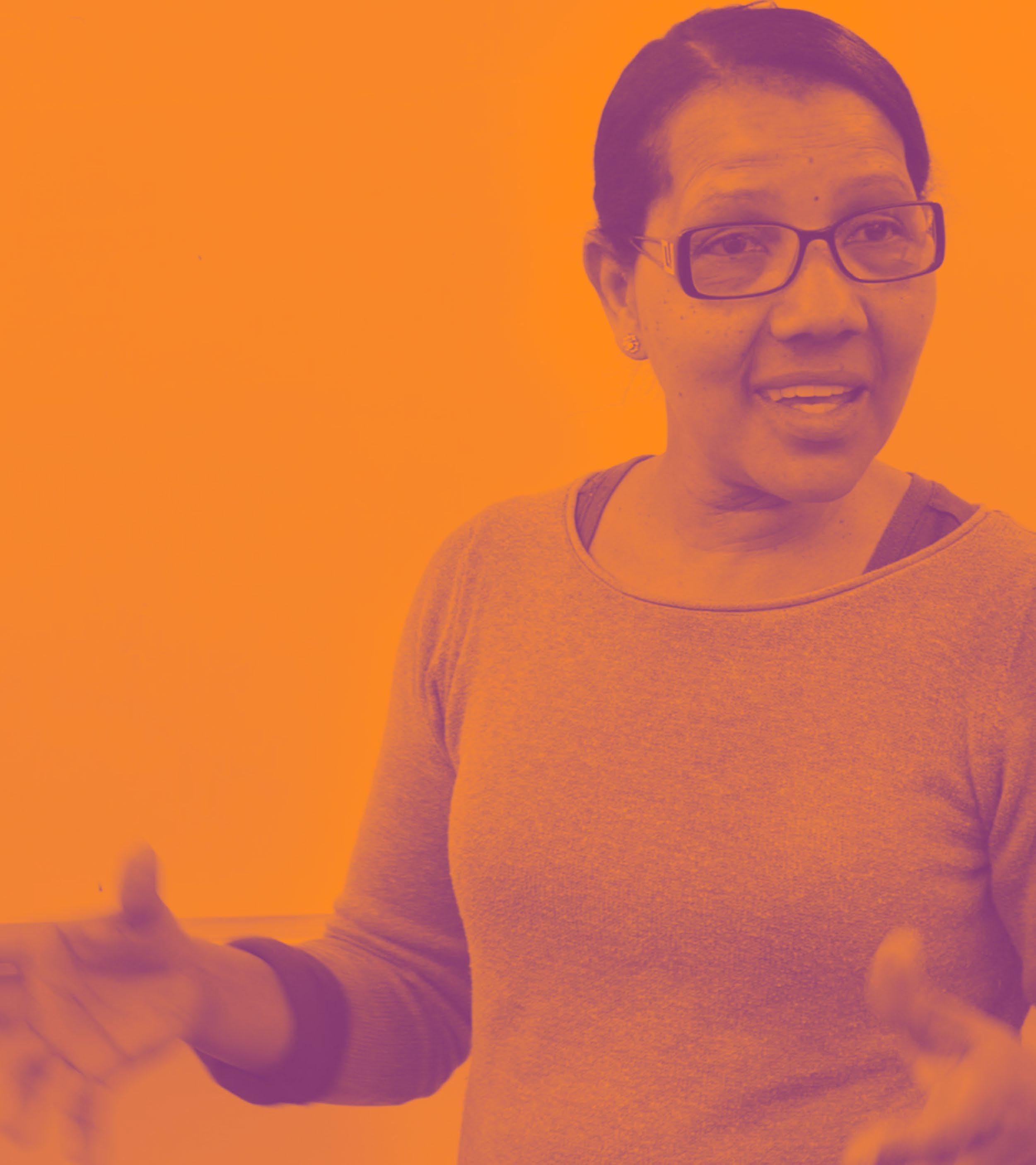
23
ANC offers high-quality math instruction in adult learning centers, schools, community colleges, corrections education, and informal settings.
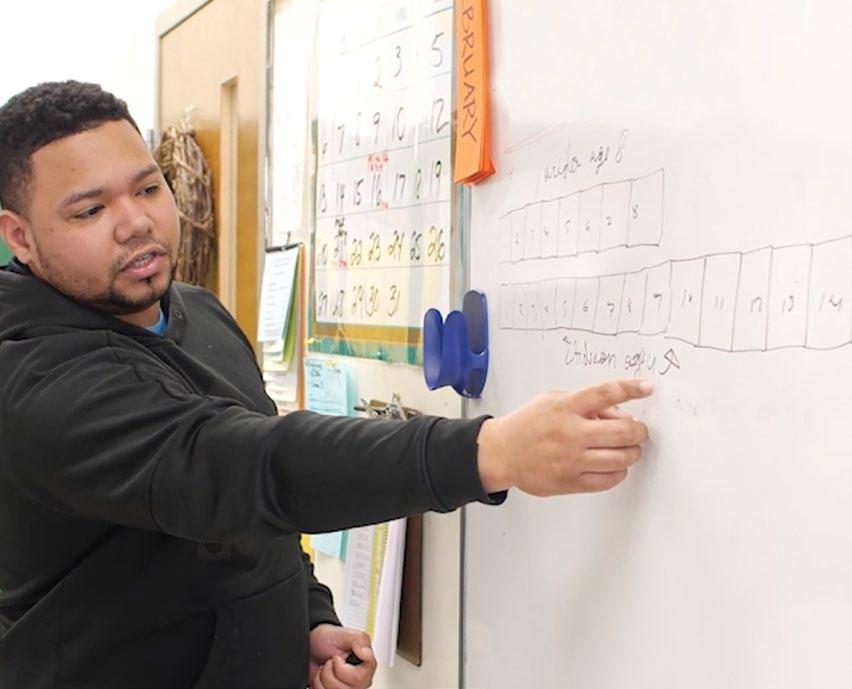
Active Fee-for-Service Contracts
In 2020–2021, the ANC team delivered professional development services to approximately 300 teachers and administrators at Chattahoochee Technical College (Georgia), ATLAS (Minnesota), the Community College of Rhode Island, the Arizona Department of Education, Technical College System of Georgia, and the Grenada School District (Mississippi).
EMPower
EMPower addresses the tremendous need for adult students to develop a strong conceptual foundation that supports the achievement of higher-level math skills. Shifting the emphasis away from formula memorization and decontextualized procedures, EMPower instead invites students to explore, investigate, connect, and collaborate on math concepts and real-world problems.
In August 2021, TERC and BW Walch Education announced a new partnership that gives learners multiple ways to interact with the EMPower series with Walch’s Curriculum Engine platform.
“We are delighted to partner with the TERC team. The quality of TERC’s work, and its reputation, are second to none. And EMPower’s approach is particularly well suited for adult learners.”
—Al Noyes, BW Walch Education President and CEO
System for Adult Basic Education Support (SABES) Mathematics and Adult Numeracy Curriculum & Instruction PD Center
The SABES Mathematics and Adult Numeracy Curriculum & Instruction PD Center provides free professional development, instructional resources, and relevant research to adult education programs and practitioners in Massachusetts. An ongoing project funded by the Massachusetts Department of Elementary and Secondary Education since 2014, its many adult education professional development offerings were utilized by more than 300 participants in 2020–2021.
24
CAM/CALM

CAM (Curriculum for Accelerated Math) is for adult learners at the pre-ASE/ASE (Adult Secondary Education) level whose goals are career- and college-readiness. The curriculum helps students develop coherence across math domains, including number sense, geometry and measurement, probability and statistics, and algebra. From 2018 to 2020, the Adult Numeracy Center team worked on a revision of the nine-unit curriculum into a new 22-unit Curriculum for Adults Learning Math (CALM). Ten teacher participants reviewed the revised content and identified HiSET (High School Equivalency Test) test questions for use in practice tests included in the CALM curriculum.
ANC has developed a wide variety of professional development offerings — and they’re creating more all the time.
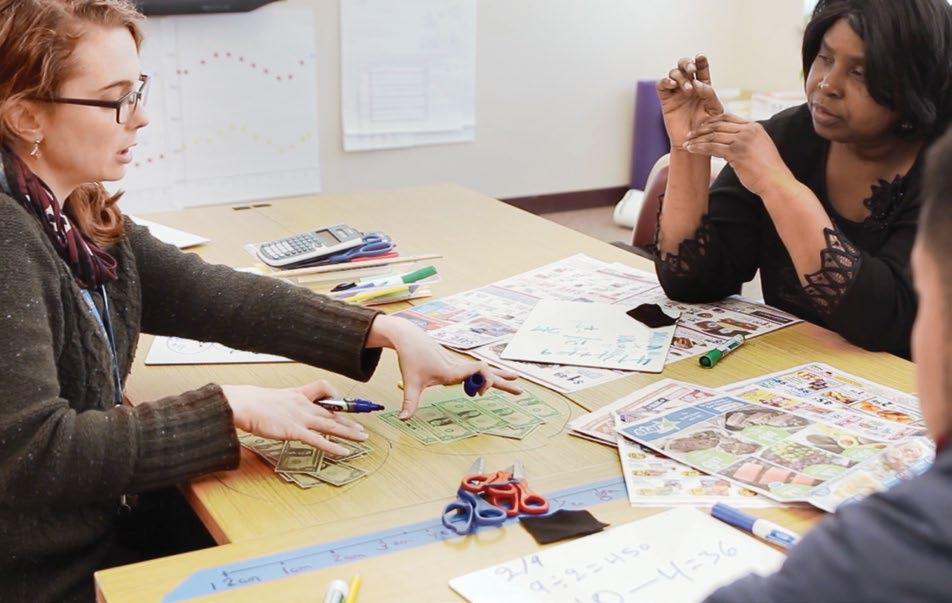
25
“When I studied math before in my life, it was like fast-paced. Half of it I don’t remember. And half of it is just so complicated. But coming to this math, it doesn’t intimidate you. No, it invites you. With this program, it makes me comprehend it so much that I am ready. I can choose what I want to do in life.”
—Math Student
INCREASING IMPACT
WHO TERC’S WEBSITE REACHES
3 , 185 DOWNLOADS ON TERC.EDU IN 2020–2021
TERC products, such as research papers, curricula, educational games, books, and white papers, are the result of many years of research and development. More learners and educators can access and benefit from these materials through our website. Website visitors from all over the world have explored our STEM education materials and resources. PEOPLE IDENTIFIED AS WORKING/ BELONGING
PEOPLE INDICATED THEY DOWNLOADED MATERIALS FOR THE FOLLOWING USES
HOW FAR TERC’S WEBSITE REACHES
26
TO TRADITIONAL SCHOOL SETTING DID NOT INDICATE COLLEGE/ UNIVERSITY ORGANIZATION/ COMPANY PARENT/ GUARDIAN OUT OF SCHOOL PROGRAM/CENTER OTHER 28 10 9 4 3 2 44
33 13 13 7 3 1 30 TEACHING RESEARCH/ PERSONAL INTEREST AT-HOME USE PROFESSIONAL DEVELOPMENT AFTER-SCHOOL PROGRAM DID NOT INDICATE TO LEARN MORE ABOUT TERC
= Countries where materials have been downloaded from terc.edu
Partnering with the Brightest Minds in STEM Education
TERC staff collaborate with teachers and school administrators to bring new STEM education approaches into the classroom. TERC facilitates grant proposals and research with colleges, universities, and other academic institutions. Our researchers team with museums, zoos, aquariums, and National Parks to build dozens of projects and programs each year. TERC works with after-school programs, community maker spaces, and adult education centers to bring STEM to diverse populations. TERC leaders partner with national corporations and other organizations that share our vision. We are grateful to the following:
Partners 2020–2021
Adler Planetarium
Amazon
American Indian Science and Engineering Society (AISES)
Auburn University
The Board of Regents of the University of Wisconsin
Baker EDM Lab, Inc.
Boston University
Bridge Multimedia Corp.
Carleton College
Charlesbridge Publishing
CodeVA
The Concord Consortium
Digital Promise Global Endicott College
FableVision
Florida State University
Fun Atomic
G{Code} House
Global Link Language Services
Gulf of Maine Research Inc.
Harvard University
High Desert Museum
ILI (The International Language Institute of Massachusetts)
Immersed Games, Inc.
IUPUI (Indiana University–Purdue University
Indianapolis)
Jason Learning
Knology Ltd
Lamar University
The Learning Partnership
Looking Glass Ventures
Mathematics Education Group
Merrimack College
Mt. Hood Community College
Museum of Science, Boston
MXTreality
MyPad3D, Inc.

New York Hall of Science
North Carolina State University
Northeastern University
Notable Human Films
Oregon State University
PERG Learning, LLC
Publishing Solutions Group
Science Education Solutions
Seattle Pacific University
SRI International Story Collider, Inc.
Student Conservation Association
Thinglink
Tufts University
University of Alabama
University of California Santa Cruz
University of Colorado
University of Florida
University of Georgia Research Foundation
University of Maine
University of Maryland
University of Massachusetts Boston
University of Notre Dame
University of Texas Austin
University of Utah
University of Wisconsin Milwaukee
Vanderbilt University
WETA-TV, Washington, D.C.
World Education
YMCA of Silicon Valley
27
Generous Support from Visionary Funders

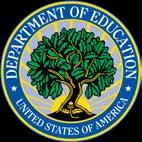


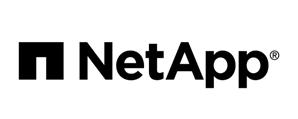


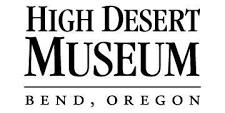


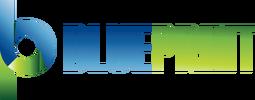
The STEM education work TERC does is only made possible thanks to our dedicated and forward-thinking funders. These visionary organizations have helped us advance our mission of improving STEM education. We are grateful to the following 2020–2021 funders:
Funders 2020–2021
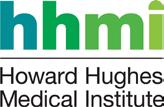

28
Blueprint Foundation Broad Institute, Inc. Fisheries & Wildlife Heising-Simons Foundation High Desert Museum Howard Hughes Medical Institute Kapor Center MA Department of Elementary & Secondary Education (DESE) National Science Foundation Net App Parametric Technology Corporation The Learning Partnership U.S. Department of Education WETA
Financials

The general fund provides a solid foundation of financial security, an important asset for a nonprofit organization. TERC has an average of two years of grant/contract commitments at the end of each year.
Revenue by Funding Source 2020
OTHER GOVERNMENT
Revenue by Funding Source 2021
Financial Overview
TERC’s revenue totaled $15.2 million in fiscal year 2021. A surplus of $1.8 million brought its net assets to $19.1 million as of December 31, 2021. TERC reinvests its net assets to further support its projects and research and launch new ideas.
years ended December 31, 2021, and 2020.
29
Financial
Fiscal
INCOME STATEMENT 2021 2020 Revenue Contract Revenue $ 9,246,018 $ 8,392,626 Other Revenue 6,001,013 4,552,571 Total Revenue $ 15,247,031 $ 12,945,197 Expenses Education Research $ 10,088,923 $ 9,888,346 Management and General 3,344,904 3,310,841 Total Expenses $ 13,433,827 $ 13,199,187 Change in Net Assets from Operations $ 1,813,204 $ (253,990) BALANCE SHEET Assets Current Assets $ 1,922,207 $ 3,044,584 Investments 18,625,934 17,081,386 Property and Equipment 62,888 96,837 Other Assets 263,790 203,557 Total Assets $ 20,874,819 $ 20,426,364 Liabilities and Net Assets Current Liabilities $ 1,746,849 $ 3,111,598 Long-Term Liabilities -Total Liabilities $ 1,746,849 $ 3,111,598 Net Assets $ 19,127,970 $ 17,314,766 Total Liabilities and Net Assets $ 20,874,819 $ 20,426,364
Statements
NSF TERC OTHER GOVERNMENT 51 23 FOUNDATIONS 21 1 2 2 WORKSHOPS PRIVATE INDUSTRY
NSF TERC 50 22 FOUNDATIONS WORKSHOPS PRIVATE INDUSTRY 22 1 3 2
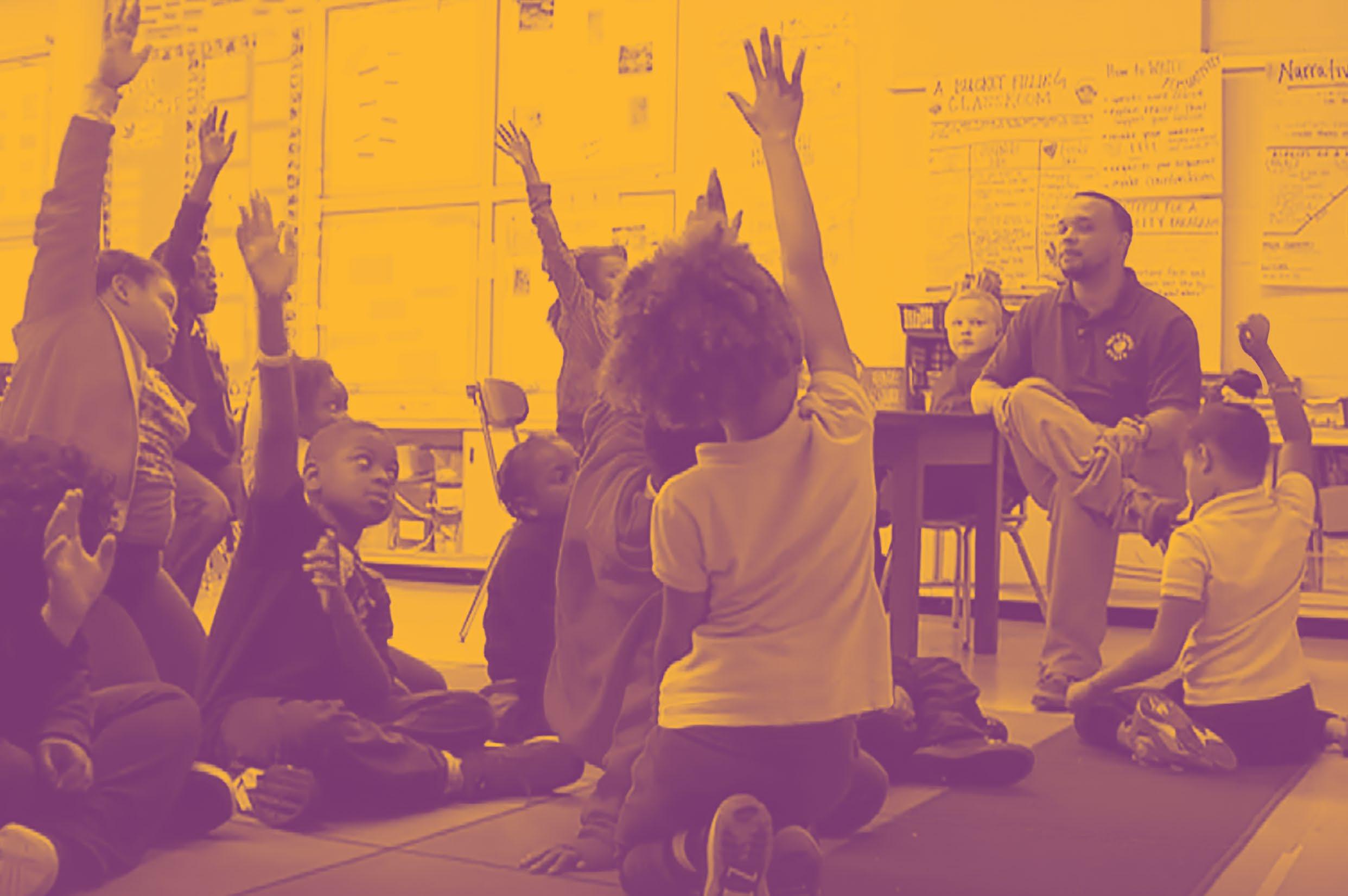
Because math and science build futures 2067 Massachusetts Avenue Cambridge, MA 02140 617-873-9600 terc.edu






 Martin Storksdieck, Ph.D. Board of Trustees Chair
Martin Storksdieck, Ph.D. Board of Trustees Chair











































































